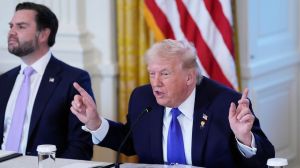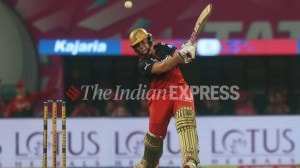Discretion becomes judges
The Ram Jethmalanai-Chief Justice-Attorney General face off, resulting in Jethmalani's sacking from the Cabinet, raises three major issues...

The Ram Jethmalanai-Chief Justice-Attorney General face off, resulting in Jethmalani8217;s sacking from the Cabinet, raises three major issues.
The first is when the apex court should speak and when it should keep silent. Press reporting of the remarks of the Chief Justice during the hearing of the Srikrishna Bombay riots Commission public interest litigation led to Jethmalani8217;s rebuttal and his sacking. The remarks took cognisance of newspaper reports which published the statements of Jethmalani and other Union ministers concerning the arrest of Shiv Sena Chief Bal Thackeray for his writing during the Bombay riots. That broke with a long tradition of judges not replying to such reports. But apparently the public interest litigation rule of the apex court that it will not rely on newspaper reports-based litigation until the editor or correspondent files an affidavit in its support, is held not to be applicable to judges themselves. Judges are supposed to speak in cases only through orders and judgments. This gives an opportunity to those affected to at least challenge and have the orders reviewed. Can remarks based on unverified newspaper reportsreplace orders or judgments?
The necessity of orders or judgments is shown by the fact that the apex court itself has been taking contrary action in the matter of public interest litigation concerning riots or similar events. In Fazlur Rahman vs UP the apex court did nothing to punish officials who had filed false affidavits of action taken on the Justice Pareekh report about the UP riots. This was discovered about ten years later when the UP government turned around to say no action had been taken because the report had not even been considered by the Cabinet. When the BJP UP government told the court finally in 1999 that it did not intend to take any action on the Justice Pareekh report the court dismissed the petition.
In the public interest litigation against the Maharashtra government for police inaction against statements by the Shiv Sena8217;s top brass inciting forced closure of cinema halls showing the duly certified film Fire , the apex court threw out the case after several hearings. The court has also observed total silence after the Prime Minister questioned the credibility of the judicial system in his public address during the court8217;s golden jubilee celebrations and the President told the judges publicly that the courts were a casino and not a cathedral.
However, given the history of the mauling of the press in the apex court, Chief Justice A.S. Anand deserves credit for not doing anything against the press reports of his remarks.
The mauling of the press started with certain judges telling the press not to report the proceedings in open court. Then came attempts by senior judges and senior advocates in the Antulay, Sabyasachi Mukherji-D.A. Desai and the Union Carbide cases to shut out the press by lifting proceedings from open court to chambers. On the crisis between the bar and the judges concerning their attending the law day function the Chief Justice, who finally met the press late at night in his chambers, told the reporters, 8220;One word of this tomorrow morning and I shall see8230;8221;
A subsequent Chief Justice, repeatedly embarrassed by reports of his comments from the bench, mounted a campaign against such reportage. With the press not relenting he hit back by directing, Atilde;sup2;f40Atilde;sup3;suo motu, the withdrawal of the fifteen-year-old convention that accredited correspondents have a right of access to the records in the registry. Finally, in the hawala case, without an order for in camera proceedings, the press was shut out week after week.
The second major issue is the role of the Attorney General and the need for transparency in what he does. Over the years the constitutional independence of the office has been undermined by its incumbents becoming legal managers and PROs vis a vis the judiciary for the ruling party at the Centre, proprietors of government briefs to be distributed as legal business to their cronies, writers of flattering letters to the Prime Minister, organisers of legal opinions and lucrative public sector work to capture the international bodies on human rights and law.
One attorney general had to be shown by his Law Minister the papers that were ready for his prosecution if he did not put in his resignation. Sunlight in this office is a desperate public need since there is little difference left between the office of the solicitor general and the attorney general except for the additional power that the latter enjoys.
In this context the third issue arises from the Prime Minister8217;s plea for harmony between the executive and the judiciary. How can harmony engendered in secrecy and under the threat of contempt power be in the public interest?
- 01
- 02
- 03
- 04
- 05































